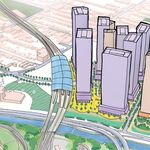M
miketoronto
Guest
Its no secret that decentralized working patterns are hurting Toronto. Loss of tax revenue, transit not being able to service new jobs in the suburbs well, increased traffic, pollution, and problems with people being able to access jobs.
So heres Miketoronto's newest idea. What do you guys think?
---
YONGE WORKS
A partnership between the City of Toronto and the Regional Municipality of York.
YONGE WORKS, would be a metropolitan wide plan to focus non-industrial jobs into the Yonge Street corridor, from downtown Toronto all the way up to Yonge and Highway 7 in Richmond Hill.
The plan would see new employment focused into downtown Toronto, as well as into major clusters of employment at
Yonge-St Clair
Yonge-Eglinton
North York City Centre
Yonge and Highway 7
The plan would call for up to 60% of metropolitan wide non industrial jobs be located in this special downtown-Richmond Hill, YONGE corridor.
The Yonge corridor is the most central area for the entire metro area, and it makes sense to focus jobs in this area.
To see the plan work, major bans on office development would have to be inacted in all Greater Toronto suburbs. Some development would be allowed in area suburbs, as not all growth can be kept in the Yonge corridor. But a target of 60% of jobs in the central Yonge corridor would be kept as the ballpark.
To accomodate the added growth in jobs, many transit improvments would be needed.
Some of the improvments would involve
-Bus only lanes along Yonge from Yonge and Highway 7 to York Mills.
-Extension of VIVA buses to York Mills Station via North York Centre.
-Bus only lanes on highway 401, to allow for more express GO BUS service to North York Centre.
-A new NORTH TORONTO transit hub station would be built at Yonge and Sheppard.
-Rapid bus service on major east west Toronto streets in the northern end of the city.
NEW OFFICE DEVELOPMENT
The city would push for signature buildings in North York City Centre, with the tallest one being a 70 story office tower.
In Downtown the city would start a partnership to see a 100 story TORONTO INTERNATIONAL TRADE CENTRE office building built. This building would act as a becon to attract business to Toronto.
YONGE WORKS, would be a boom for the city.
The city would see
-Increased employment
-More jobs for city residents
-A more vibrant downtown
-A more virant central Yonge corridor
-A more pedestrian friendly Yonge corridor in Richmond Hill
-Ease of access for jobs for all metropolitan residents.
YONGE WORKS
So heres Miketoronto's newest idea. What do you guys think?
---
YONGE WORKS
A partnership between the City of Toronto and the Regional Municipality of York.
YONGE WORKS, would be a metropolitan wide plan to focus non-industrial jobs into the Yonge Street corridor, from downtown Toronto all the way up to Yonge and Highway 7 in Richmond Hill.
The plan would see new employment focused into downtown Toronto, as well as into major clusters of employment at
Yonge-St Clair
Yonge-Eglinton
North York City Centre
Yonge and Highway 7
The plan would call for up to 60% of metropolitan wide non industrial jobs be located in this special downtown-Richmond Hill, YONGE corridor.
The Yonge corridor is the most central area for the entire metro area, and it makes sense to focus jobs in this area.
To see the plan work, major bans on office development would have to be inacted in all Greater Toronto suburbs. Some development would be allowed in area suburbs, as not all growth can be kept in the Yonge corridor. But a target of 60% of jobs in the central Yonge corridor would be kept as the ballpark.
To accomodate the added growth in jobs, many transit improvments would be needed.
Some of the improvments would involve
-Bus only lanes along Yonge from Yonge and Highway 7 to York Mills.
-Extension of VIVA buses to York Mills Station via North York Centre.
-Bus only lanes on highway 401, to allow for more express GO BUS service to North York Centre.
-A new NORTH TORONTO transit hub station would be built at Yonge and Sheppard.
-Rapid bus service on major east west Toronto streets in the northern end of the city.
NEW OFFICE DEVELOPMENT
The city would push for signature buildings in North York City Centre, with the tallest one being a 70 story office tower.
In Downtown the city would start a partnership to see a 100 story TORONTO INTERNATIONAL TRADE CENTRE office building built. This building would act as a becon to attract business to Toronto.
YONGE WORKS, would be a boom for the city.
The city would see
-Increased employment
-More jobs for city residents
-A more vibrant downtown
-A more virant central Yonge corridor
-A more pedestrian friendly Yonge corridor in Richmond Hill
-Ease of access for jobs for all metropolitan residents.
YONGE WORKS




